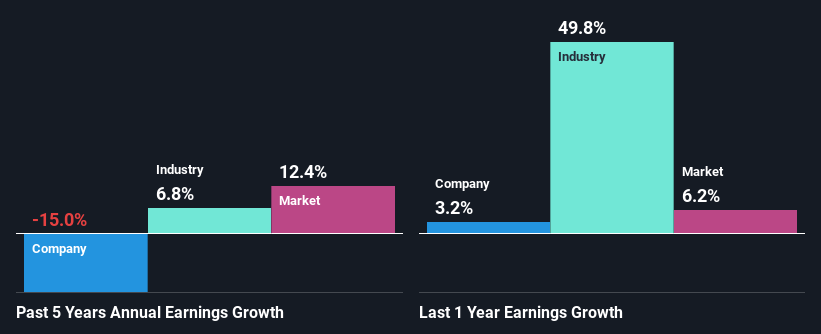Michael Hill International Limited's (ASX:MHJ) Stock is Soaring But Financials Seem Inconsistent: Will The Uptrend Continue?
Most readers would already be aware that Michael Hill International's (ASX:MHJ) stock increased significantly by 13% over the past three months. However, we wonder if the company's inconsistent financials would have any adverse impact on the current share price momentum. Specifically, we decided to study Michael Hill International's ROE in this article.
Return on equity or ROE is an important factor to be considered by a shareholder because it tells them how effectively their capital is being reinvested. Put another way, it reveals the company's success at turning shareholder investments into profits.
View our latest analysis for Michael Hill International
How Do You Calculate Return On Equity?
The formula for return on equity is:
Return on Equity = Net Profit (from continuing operations) ÷ Shareholders' Equity
So, based on the above formula, the ROE for Michael Hill International is:
11% = AU$21m ÷ AU$191m (Based on the trailing twelve months to December 2020).
The 'return' is the amount earned after tax over the last twelve months. That means that for every A$1 worth of shareholders' equity, the company generated A$0.11 in profit.
Why Is ROE Important For Earnings Growth?
We have already established that ROE serves as an efficient profit-generating gauge for a company's future earnings. We now need to evaluate how much profit the company reinvests or "retains" for future growth which then gives us an idea about the growth potential of the company. Assuming all else is equal, companies that have both a higher return on equity and higher profit retention are usually the ones that have a higher growth rate when compared to companies that don't have the same features.
Michael Hill International's Earnings Growth And 11% ROE
At first glance, Michael Hill International seems to have a decent ROE. Be that as it may, the company's ROE is still quite lower than the industry average of 19%. Needless to say, the 15% net income shrink rate seen by Michael Hill Internationalover the past five years is a huge dampener. Not to forget, the company does have a high ROE to begin with, just that it is lower than the industry average. Hence there might be some other aspects that are causing earnings to shrink. These include low earnings retention or poor allocation of capital.
However, when we compared Michael Hill International's growth with the industry we found that while the company's earnings have been shrinking, the industry has seen an earnings growth of 6.8% in the same period. This is quite worrisome.
Earnings growth is an important metric to consider when valuing a stock. What investors need to determine next is if the expected earnings growth, or the lack of it, is already built into the share price. Doing so will help them establish if the stock's future looks promising or ominous. If you're wondering about Michael Hill International's's valuation, check out this gauge of its price-to-earnings ratio, as compared to its industry.
Is Michael Hill International Making Efficient Use Of Its Profits?
Michael Hill International's declining earnings is not surprising given how the company is spending most of its profits in paying dividends, judging by its three-year median payout ratio of 75% (or a retention ratio of 25%). With only very little left to reinvest into the business, growth in earnings is far from likely. To know the 2 risks we have identified for Michael Hill International visit our risks dashboard for free.
In addition, Michael Hill International has been paying dividends over a period of five years suggesting that keeping up dividend payments is preferred by the management even though earnings have been in decline. Based on the latest analysts' estimates, we found that the company's future payout ratio over the next three years is expected to hold steady at 67%. Still, forecasts suggest that Michael Hill International's future ROE will rise to 18% even though the the company's payout ratio is not expected to change by much.
Summary
In total, we're a bit ambivalent about Michael Hill International's performance. On the one hand, the company does have a decent rate of return, however, its earnings growth number is quite disappointing and as discussed earlier, the low retained earnings is hampering the growth. That being so, the latest industry analyst forecasts show that analysts are forecasting a slight improvement in the company's future earnings growth. This could offer some relief to the company's existing shareholders. To know more about the latest analysts predictions for the company, check out this visualization of analyst forecasts for the company.
This article by Simply Wall St is general in nature. It does not constitute a recommendation to buy or sell any stock, and does not take account of your objectives, or your financial situation. We aim to bring you long-term focused analysis driven by fundamental data. Note that our analysis may not factor in the latest price-sensitive company announcements or qualitative material. Simply Wall St has no position in any stocks mentioned.
Have feedback on this article? Concerned about the content? Get in touch with us directly. Alternatively, email editorial-team (at) simplywallst.com.

 Yahoo Finance
Yahoo Finance 
